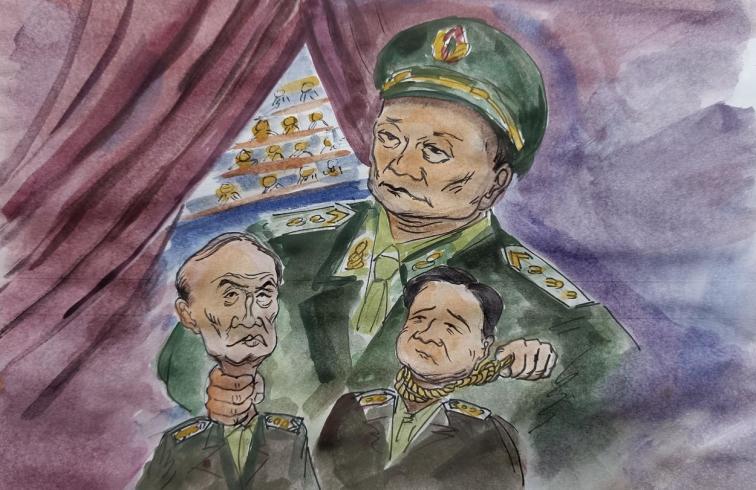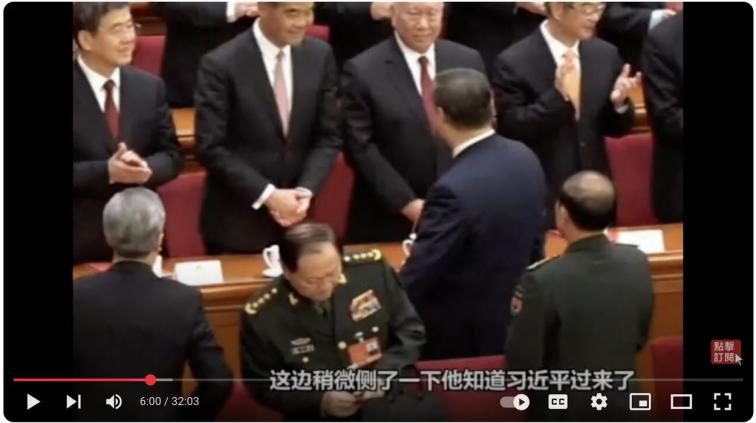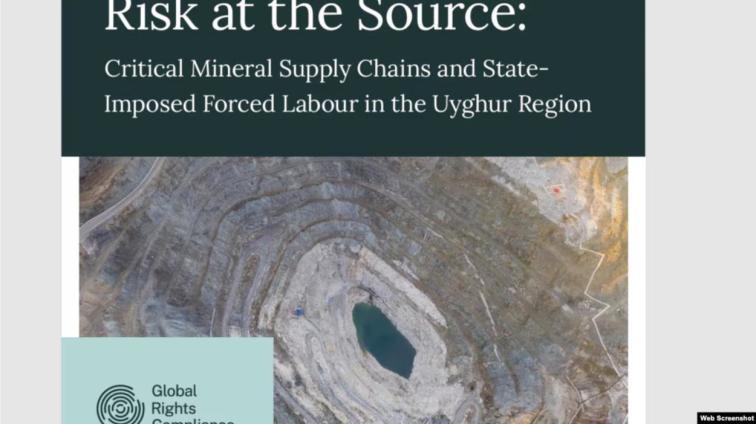The Five Pillars of Control Under Xi's CCP Rule (Meiqing / People News)
[People News] Recently, a video released by exiled Chinese media personality Su Xiaohe has stirred public attention. The content directly points to the Xi Jinping family's long-standing deployment of a "Sinking Ship Plan" to guard against sudden upheaval in China. Meanwhile, the Office of the Director of National Intelligence (ODNI) in the United States has publicly released a new report titled “Wealth and Corruption Activities of Chinese Communist Leaders.” For the first time, it officially discloses that Xi Jinping's family may still hold millions of dollars in commercial and financial assets. These two developments echo each other, revealing a deep crisis within the CCP leadership and the entrenched systemic corruption that has plagued the regime for years.
1. What Is the "Sinking Ship Plan"?
As early as 2016, Beijing scholar Chen Yongmiao proposed the term “Sinking Ship Plan.” In an article published in a Hong Kong media outlet, he stated that a hidden plan exists among CCP elites: the top echelon is ruthlessly extracting the remaining value from society—"killing the chicken to get the egg"—to pave a way of escape using the people's money, while the masses and their descendants are left to struggle in a deteriorating environment, both natural and moral.
The article also mentioned another plan called the “Doomsday Ark Plan”: all necessary foreign countries have already been bribed, money laundering has long been completed, and once the regime collapses, the CCP will activate a nationwide file self-destruction system to erase all dangerous historical records. Then, the entire family of the elite can retreat calmly to a chosen safe country, ensuring wealth and security for several generations.
Su Xiaohe states that the "Sinking Ship Plan" is a common political risk-avoidance strategy among top CCP officials, whereby they establish safe havens abroad, especially in the United States, in case of sudden political turmoil.
Su revealed that the Xi family is particularly sensitive to this issue. Xi Jinping's father, Xi Zhongxun, once reportedly said, "Only one person in the family should engage in politics; the rest should live overseas." As such, most core members of the Xi family—his siblings and daughter Xi Mingze—live abroad and possess substantial overseas assets.
The leak also points out that Xi Mingze has recently been arranged to attend certain diplomatic and political occasions, sparking speculation that she is being groomed as a successor. However, multiple analysts believe Xi Mingze lacks both political experience and Party clout. Such appearances are more likely a smokescreen to distract from the real goal: transferring family assets and ensuring safety.
Conservative American journalist Laura Loomer recently posted on the social media platform X, claiming that Xi Jinping’s daughter, Xi Mingze, lives in Massachusetts and is guarded by private security from the Chinese People's Liberation Army (PLA).
She publicly called for Xi Mingze’s expulsion: "Communists don’t belong in America!" Loomer even threatened to film a confrontation video and question Xi Mingze face-to-face about her father.
Xi Mingze graduated from Harvard University in 2014 with a Bachelor of Arts in Psychology. Loomer alleged she still resides in Massachusetts under a student visa. However, there is no publicly available evidence to confirm that she currently lives in the U.S.
According to the Belarus state news agency BelTA, First Deputy Prime Minister Snopkov revealed on national television that Peng Liyuan and Xi Mingze attended a dinner hosted by Xi Jinping for Belarusian President Lukashenko on June 4.
Additionally, a confidential briefing submitted by Russia’s Foreign Intelligence Service (SVR) to the Kremlin on June 9 claimed that Xi Jinping is gravely ill, having suffered multiple heart attacks from May 25 through early June. Doctors reportedly warned that continued participation in public meetings could be life-threatening.
Commentators suggest that if Xi is seriously ill and meeting with Lukashenko, it could be an attempt to hand off responsibilities, entrusting future matters to an ally.
Su Xiaohe further revealed that amid recent U.S.–China tensions and after Xi Mingze was reportedly named by the U.S., the Xi family fled to Russia for a period. With relations now easing, Su speculates they may have returned to the U.S.
On March 20, 2025, the U.S. Office of the Director of National Intelligence released the report “Wealth and Corruption Activities of Chinese Communist Leaders” (mandated by the 2023 National Defence Authorisation Act). Though unclassified, this document marks the first time the U.S. government has systematically assessed the wealth and corruption of China’s top leadership.
The report notes that although Xi Jinping may have ordered his relatives to divest in 2012 to reduce public scrutiny, "industry research and market investigations" indicate that by 2024, his family still holds offshore assets worth millions of dollars through trusts or shell companies. The report states: “While current data does not directly implicate Xi Jinping himself, the shareholding arrangements show a high degree of correlation.”
It cites multiple studies concluding that corruption in the CCP is “widespread and deeply entrenched, both vertically and horizontally.” For example, one investigation estimates that about 65% of CCP officials have accepted bribes or engaged in illicit enrichment, with local officials being especially corrupt.
Since Xi Jinping launched his “anti-corruption campaign” in 2012, nearly 5 million individuals have been investigated for job-related crimes. However, the report emphasises that the campaign has primarily served to eliminate rivals and consolidate power, rather than to truly tackle systemic corruption.
Notable corruption cases include:
Lai Xiaomin of China Huarong: embezzled nearly 1.8 billion RMB
Cai Guohua of Hengfeng Bank: nearly 1.2 billion RMB
Li Jianping of Hohhot Development Zone: over 3 billion RMB in illicit assets
In 2024, the probe into China Securities Regulatory Commission official Yao Qian revealed that even the “digital yuan project” has been caught up in internal power struggles.
The report specifically points out that the recent CCP purge of military leadership reflects concern over “instability in military morale.” Since 2023, top military figures such as Defence Minister Li Shangfu and Central Military Commission Political Work Department head Miao Hua have been investigated. Rumours of Vice Chairman He Weidong being “taken away” remain unconfirmed but are widely viewed as a precursor to a new wave of military infighting.
Analysts believe this round of purges goes beyond corruption and centres on whether Xi Jinping can maintain control of the military (“the barrel of the gun”) to ensure readiness for potential military action across the Taiwan Strait before 2027.
Although the U.S. report is only six pages long, it reflects an investigation that spanned two and a half years and faced lobbying pressure from the Chinese embassy in Washington. This indicates that the U.S. still holds a substantial amount of undisclosed intelligence on the matter.
Taiwan’s Institute for National Defence and Security Research noted that the U.S. report not only aims to understand the real scope of corruption within the CCP leadership but may also serve as a strategic tool for pressure, especially if U.S.–China tensions escalate to a pre-war phase. This also explains why the report was published at this time: to "shake the mountain and scare the tiger," preparing for any political upheaval.
The exposure of both the "Sinking Ship Plan" and the Xi family’s overseas assets not only highlights the deep anxiety within the CCP leadership about the regime’s future but also puts the stability of Xi Jinping's personal rule under scrutiny. As the public becomes more aware of how elite families have built overseas safety nets and amassed massive wealth, the CCP’s legitimacy and public support may face an unprecedented crisis.
As the Chinese proverb goes, “A cunning rabbit has three burrows.” The CCP elite have long been preparing for the day of reckoning. △
(First published by People News)










News magazine bootstrap themes!
I like this themes, fast loading and look profesional
Thank you Carlos!
You're welcome!
Please support me with give positive rating!
Yes Sure!